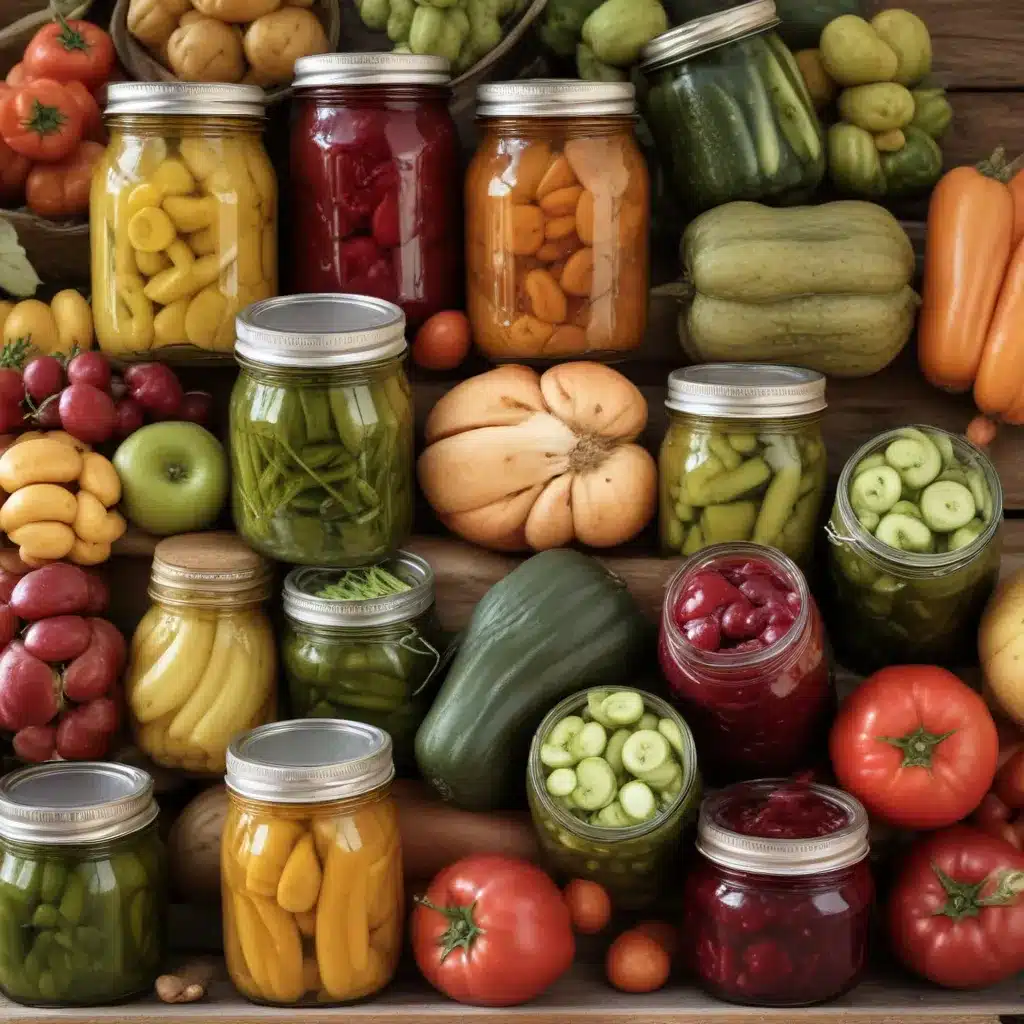
Here is a 2,500-word article on “Preserving the Harvest: Canning and Pickling Favorites on the Farm” for Crooked Pines Farm:
As the days grow shorter and a chill creeps into the air, it’s time to start thinking about preserving the bounty from our fields and gardens at Crooked Pines Farm. The tomatoes may be winding down, but the apple trees are heavy with fruit, and the pepper plants are still going strong. With a little know-how, we can capture the flavors of the season and enjoy them well into the winter months.
Canning Techniques
There are two main canning methods we use to preserve our harvest: water bath canning and pressure canning. Water bath canning is perfect for high-acid foods like jams, pickles, and tomato sauce. The jars are submerged in boiling water, which heats the contents to 212°F, killing any potential microorganisms. This method is relatively simple and doesn’t require any specialized equipment beyond a large pot and some canning jars.
For low-acid foods like green beans, carrots, and corn, we turn to pressure canning. This process uses steam under pressure to reach temperatures up to 240°F, ensuring the complete destruction of harmful bacteria. While a bit more involved, pressure canning is essential for safely preserving many of our vegetable crops.
In addition to these canning methods, we also employ dehydration to preserve some of our produce. Drying concentrates the flavors and allows us to store items like apple slices, tomato powder, and herb blends for months on end. The key is maintaining the right balance of temperature, airflow, and moisture content.
Pickling Methods
Pickling is another popular way to extend the life of our harvest. We use a few different techniques, each with its own advantages.
Fermented Pickles are made by submerging vegetables in a saltwater brine, which allows beneficial bacteria to grow and produce lactic acid. This natural preservative not only gives the pickles their signature tang but also helps them stay crisp and crunchy. Fermented pickles can last for months in a cool, dark place.
For a quicker pickle, we turn to Vinegar-Based Pickles. These are made by heating a mixture of vinegar, water, salt, and spices, then pouring it over the prepared vegetables. The acidity of the vinegar inhibits the growth of harmful microbes, allowing the pickles to be shelf-stable for up to a year.
Finally, we also make Refrigerator Pickles for more immediate consumption. These require no canning or fermentation – we simply toss the veggies in a brine and let them hang out in the fridge. They’re ready to enjoy in just a week or two, and their crunchy texture and bright flavors make them a perfect snack or sandwich topping.
Crop Selection
When it comes to preservation, not all crops are created equal. Some fruits and vegetables simply lend themselves better to canning, pickling, and drying.
On the vegetable side, we always put up plenty of tomatoes, whether as sauce, salsa, or whole canned tomatoes. Cucumbers are another staple, going into traditional dill pickles as well as relishes and chutneys. And of course, we can’t forget our beloved peppers – from mild bells to fiery habaneros, they add a signature kick to all sorts of preserved goods.
As for fruits, apples are a no-brainer. We make applesauce, apple butter, and plenty of canned apple pie filling to enjoy throughout the winter. Berries like strawberries, raspberries, and blueberries also preserve beautifully, whether as jams, syrups, or whole canned fruit. And stone fruits like peaches, plums, and cherries lend themselves well to canning, drying, and pickling.
Flavor Profiles
When it comes to preserving, the possibilities for flavor profiles are endless. We love to play with different spice and herb combinations to create unique taste experiences.
For a savory twist, we might turn to bay leaves, peppercorns, coriander, and garlic to season our dill pickles or canned tomatoes. For sweeter preserves, cinnamon, vanilla, and citrus zest are go-to additions. And don’t forget the role of vinegar – from fruity apple cider to bold balsamic, the type you choose can dramatically impact the final flavor.
Of course, we always make sure to use organic, non-GMO ingredients wherever possible, keeping in line with our sustainable farming practices. And we try to source as many of our spices and flavorings from local producers, further strengthening our community ties.
Farm-to-Table Lifestyle
Preserving the harvest is about more than just stocking our own pantry. It’s a way of life that connects us to the rhythms of the seasons and the land we steward.
By canning and pickling our crops, we reduce food waste and minimize our environmental impact. Any surplus produce that doesn’t get preserved is composted, and we use that nutrient-rich soil to nourish next year’s garden. It’s all part of our commitment to organic, sustainable agriculture here at Crooked Pines.
But it’s not just about what happens on the farm. We also love to share our preserving know-how with the broader community. You’ll often find us at the local farmers market, chatting with customers about the ins and outs of canning tomatoes or pickling peppers. And through our CSA program, we provide members with seasonal recipes and preservation tips to make the most of their weekly veggie hauls.
Whether you’re a seasoned home canner or just starting to explore the world of pickling, we hope you’ll join us on this journey of capturing the flavors of the harvest. After all, there’s nothing quite like cracking open a jar of homemade applesauce or bread-and-butter pickles in the middle of winter, reconnecting with the bounty of the farm. So let’s get preserving!


